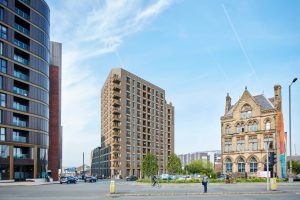Future looks bleak for URCs, says think tank

THE FUTURE for the region’s remaining urban regeneration companies (URCs) looks increasingly bleak as a result of ongoing cuts to their primary sources of revenue, according to think tank Centre for Cities.
Andrew Carter, director of policy and research at Centre for Cities, said: “Any organisation which relies on third party funding to fund it will be susceptible.”
Within the past few weeks, decisions have been announced to axe Central Salford’s Urban Regeneration Company and to lay off the four-strong operational staff at Preston Vision
Both organisations blamed cuts in funding, following the demise of the North West Regional Development Agency which provided a significant element of their core funding. Like many URCs, Central Salford also relied on the Homes & Communities Agency (HCA) for funding, with the remainder coming from the local authority.
The HCA’s budget was cut in half earlier this week and it announced that budget cuts meant that it was scrapping funding for around £1.9bn worth of regeneration schemes, including a plan to transform the Collyhurst estate in north Manchester.
As a result, doubts have been expressed about the future of the region’s other regeneration companies.
Mr Carter said that the fact that URCs were set up as “partnership” bodies to collaborate with local authorities and private sector developers meant that they were vulnerable, particularly as authorities have to find massive savings in their own core budgets.
“It will be interesting to see how much of their roles will be picked up by the proposed local enterprise partnerships,” he said.
Eddie Smith, chief executive of the region’s biggest URC, New East Manchester, told TheBusinessDesk.com that it was “currently considering options” and that a decision about its future would be made by the end of January.
“East Manchester will remain a high priority and we will continue to ensure that the regeneration of the area is sustained,” he said.
New East Manchester began trimming its own staff in May last year in anticipation of future funding cuts. There is now a core staff of around 20 people responsible for delivery of its programmes, but they are employed directly by Manchester City Council.
“There are a number of long term, major initiatives at Central Park, Eastlands, the Ashton Old Road Corridor and in Ancoats which we are committed to delivering that will create significant numbers of new jobs in the area. In addition to these priorities, the creation of new homes within East Manchester will remain a major focus.
He added that there was “no intention” of the organisation downing tools and letting its regeneration efforts peter out.
Phil Woolley, a partner at Grant Thornton’s government and infrastructure advisory team in Manchester, said that the URCs’ main problem was that many didn’t hold the assets of the land that they were responsible for redeveloping.
“Councils will have to find new ways to capitalise them”.
Unless they do, he said that local authorities would either be forced “to take the funding back or significantly downsize them”.
He argued that some of them could continue if local authorities were prepared to place council-owned land assets in them to form joint venture companies.
Felicity Goodey, who was chair of Central Salford’s URC, said the fact that the organisations were collaborative bodies meant that they were more effective than the Urban Development Companies that preceded them.
“Some have been more successful than others, but the ones that worked were in the main those where real partnerships were about. They had to operate by consent.”
For instance, she said that Central Salford had built protocols with Salford City Council whereby new land which came up for potential disposal or new planning applications on sites in its area were first referred to it.
Although it did not have any statutory powers to block proposed schemes, it was given an input into whether they were in line with the overall development model for an area.
“This meant the good developers looking to work with us knew they were doing it in an area where standards were uniformly high,” she said.
She added that the organisation had helped to bring in £1bn worth of investment and is working with Salford City Council on the handover of its responsibility for schemes such as Irwell River Park and the regeneration of Chapel Street.
“I have every confidence that the appeal of Salford which we helped to build is still there.”
Mr Smith said that New East Manchester was “now over one third of a way into a 30 year journey of transforming this part of Manchester by growing the area’s employment base and creating popular neighbourhoods where people working in the city want to live”.
“We will work closely with the City Council, the community and the private sector going forward to achieve our vision for this important part of the city,” he added.








